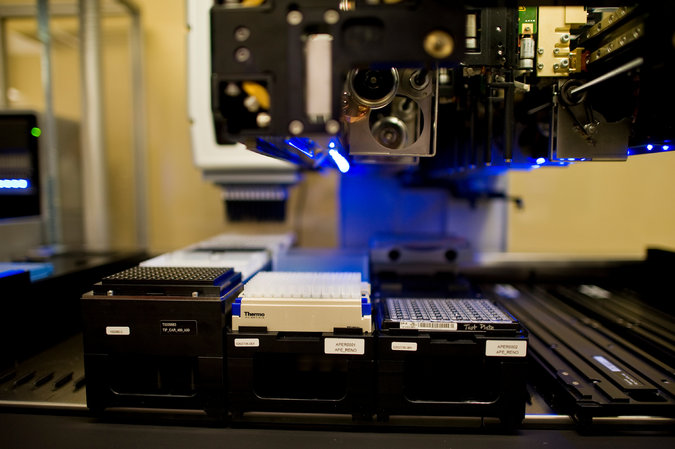Scientists announced the launch of the HGP-write project, the ultimate goal of which is the creation of a complete synthetic human genome

In early June, a group of biotechnologists from the non-profit organization Center for Excellence for Engineering Biology ( Center of Excellence for Engineering Biology ) announced the final preparations for the launch of a new large-scale project called Human Genome Project-Write (HGP-write) in which it will undertake the first in the history of mankind attempt to synthesize a complete artificial human genome. The conceptual basis of this project will be the research results obtained in the framework of the previous Human Genome Project ( HGP-read ), which, having successfully implemented, the scientists were able to read, organize and compile a complete map of the human genome for the first time.

Since the opening of access to HGP-read technology, the cost of DNA sequencing has declined many times, and today it is possible to sequence the entire human DNA with a total of $ 1,000. Research results are usually used for medical diagnoses, plant breeding and scientific research. HGP-write organizers hope to do the same with DNA synthesis and reduce its cost by more than 1000 times in the coming decade.
')
Scientists have already learned how to transform DNA, and the latest methods of “genome editing”, such as the Crispr technology, which has repeatedly proven its effectiveness, make it possible to reorganize an organism’s DNA plan in accordance with current tasks. The immensely large possibilities are concluded in the synthesis of DNA from scratch - the project organizers are sure. During the implementation of the HGP-write project, researchers plan to develop technologies that will drastically reduce the cost of creating long gene sequences, including the human genome.
Another important focus is the development of a number of rules and regulations to resolve the contradictions and ethical problems that inevitably arise in the course of practical research in this delicate direction.
Despite the emerging prospects and resonance in the scientific community, the news did not evoke complete unanimity. From an ethical point of view, the HGP-write project has already caused a lengthy series of questions. After all, access to a fully engineered artificial genome opens up unthinkable opportunities for artificially creating people whose social status, as well as their very belonging to society, are in question. Moreover, replication of a person may well be carried out without his consent, as it is possible to create people without the need for the participation of a “third” party - biological parents.
According to the direct organizers of the project, their final goals look much more mundane and more practical. In particular, the creation of an artificial genome stimulates the creation and development of medical technologies of the new generation. So, for example, we can talk about creating the 21st chromosome, an additional copy of which is associated with the onset of Down syndrome, the development of new, highly efficient ways of growing organs for transplantation, the creation of cancer-resistant cell populations, the formation of immunity to various deadly viruses, the development of new vaccines , technologies so-called. "Point of control" of certain types of diseases and many other opportunities that you can only dream of today.
The first very fragmentary information about the plans associated with the start of work on the HGP-write project became publicly available to the scientific community about a month ago and was discussed at a closed meeting with specialists from the Center and Harvard Medical School. The meeting was held behind closed doors, without the access of journalists to scientific publications, exacerbated the discussion and became an occasion for expanding the camp of project critics. For example, Dr. Francis S. Collins, director of the National Institutes of Health, the main source of funding for medical research in the United States, spoke out very cautiously about the prospects for funding.
Explaining his point of view, Dr. Collins said that he had previously been interested in promoting research on DNA synthesis, but did not find it right that the time had come to finance large-scale production of the entire human genome. “The reproduction of the whole genome, the synthesis of the whole organism goes far beyond the framework of modern scientific possibilities, and it is still difficult to assess the significance and urgency of numerous ethical and philosophical problems right away,” Collins added.

On June 2, 2016, more detailed information about the project, its goals and methods was published on the pages of the journal Science. According to the organizers of HGP-write, taking into account the scope and significance of the project, in addition to the scientific specialists of a narrow profile, leading experts in legal and ethical issues are already involved in it today.
The planned implementation time for the HGP-write project is 10 years. The exact cost of the project is not reported, according to preliminary estimates, it will exceed $ 1 billion. Preliminary work is underway, and the start will be made closer to the end of 2016 after the amount of $ 100 million has been collected. Here, experts hope for assistance from scientific, public organizations and private investors. Taking into account the rates, there is every reason to believe that this amount will be collected as soon as possible.
Science publication
Publication in The New York Times
That's all, with you there was a simple service for choosing sophisticated Dronk.Ru equipment. Do not forget to subscribe to our blog , there will be many more interesting ...

 |  |  |
| Why do online stores give money for purchases? | Save up to 8% on every purchase on AliExpres and other online stores in China | Return your money - choose a cashback service for Aliexpress |
Source: https://habr.com/ru/post/395485/
All Articles